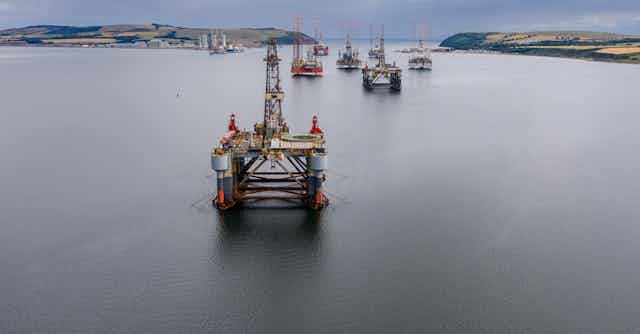The Labour Party has announced that it intends to stop the development of any new oil and gas fields in UK territory if it forms the next government.
The move will have far-reaching consequences, leading to a rapid contraction of the UK’s oil and gas industry over the next decade. So it’s no surprise that much of the reaction from newspapers, businesses and trade unions has been very negative. The current prime minister, Rishi Sunak, has gone so far as to call Labour’s proposed policy “bizarre” and the product of “eco-zealots”.
But Labour is currently well ahead in the polls, and with an election due by early 2025, there’s a real possibility that banning further fossil fuel development could become official UK government policy within the next two years.
So, it’s important to know if Sunak is right. Is Labour’s vow to halt new oil and gas fields ill-advised and even “bizarre”?
In fact, according to my calculations, burning all the UK’s existing oil and gas reserves will already produce more than the UK’s fair share of greenhouse gas emissions under the 2015 Paris Climate Agreement – so suggesting we look for more seems bizarre to me.
It only makes sense if the people making such decisions have no intention of sticking to the UK’s international obligations to tackle climate change.
Limiting temperature rise
Under the Paris Agreement, nearly every country in the world is legally obliged to prevent dangerous climate change. Signatories are committed to pursuing efforts to limit global heating to 1.5°C above pre-industrial levels.
Recent estimates suggest that in order to meet this target, we must emit no more than the equivalent of 250 billion tonnes (250 gigatonnes) of CO₂ globally. To put this in context, we’ve already emitted 1,500 gigatonnes of CO₂ since the industrial revolution, meaning about 86% of all the emissions we can get away with have already been released into the atmosphere.
The consequences of exceeding 1.5°C of global warming will be severe. Temperatures have already risen 1.2°C above pre-industrial times, and at this level of heating, we are seeing increasingly frequent and intense heat, precipitation, droughts, hurricanes and glacier loss. So, even 1.5°C of global warming may be too much.

Emissions from existing reserves
If the global budget of emissions for keeping temperature rise below 1.5°C is shared equally across the world’s population, then the UK should contribute no more than 2.5 gigatonnes. Yet 43% of our emissions are “embedded”, meaning they are produced when the goods we buy are manufactured abroad. Our domestic emissions should therefore be no more than the remaining 57% – that’s just 1.4 gigatonnes.
How does this stack up against the future emissions from the UK’s oil and gas reserves?
The UK government’s own estimate of reserves (oil and gas remaining in existing fields and likely developments of them) is around 4 billion barrels. A barrel is the oil industry’s rather odd way to measure volume (it equates to about 160 litres). Setting fire to a barrel of oil releases roughly 430 kg of CO₂ into the atmosphere.
Taking this figure into account, 1.7 gigatonnes of CO₂ would be released into the atmosphere if all of the UK’s reserves were extracted and burned. That’s 300,000 tonnes more than the UK’s remaining emissions budget.
Stop fossil fuel exploration
The message is clear: in the UK, we cannot safely burn all of the oil and gas reserves we already have. So, it make no sense to invest money and jeopardise our collective futures by developing new fields.
Doing so will result in two unfavourable scenarios. Either we will be left with hydrocarbons that we cannot sell as the world transitions to alternative energy sources, or we will burn it anyway and disregard the climate consequences.
That’s why, in my opinion, it’s “bizarre” to develop new fields. And I’m someone who has spent 40 years working in or with the hydrocarbon exploration industry. Simple arithmetic tells us we have to stop, but it’s arithmetic that many of our political leaders have yet to grasp.
The same is true on a global scale. The world’s oil reserves are still going up because, every year, we find more oil than we use.
The latest estimate of global reserves stands at 1,757 billion barrels. Following the same calculations as before, these reserves would generate the equivalent of 760 gigatonnes of CO₂ when burned. That’s three times the world’s safe emissions limit.
If released, these CO₂ emissions would take global temperatures over 2°C above the pre-industrial level – a clear breach of the Paris agreement.

I’m not the first person to point this out. In fact, the International Energy Agency (a multi-government organisation set up in 1974 to promote the security of oil supplies) stated last year that “there is no need for investment in new fossil fuel supply in our net zero pathway”.
If the International Energy Agency says we should stop developing new fields, then perhaps we should listen. Several nations, including Denmark, Ireland, France and Costa Rica, paid attention and have announced they will discourage continued investment in increasing the production of oil and natural gas. It’s time the UK joined them.

Don’t have time to read about climate change as much as you’d like?
Get a weekly roundup in your inbox instead. Every Wednesday, The Conversation’s environment editor writes Imagine, a short email that goes a little deeper into just one climate issue. Join the 20,000+ readers who’ve subscribed so far.

